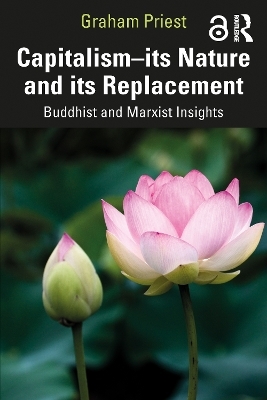
Capitalism--its Nature and its Replacement
Buddhist and Marxist Insights
Seiten
2021
Routledge (Verlag)
978-1-032-04910-6 (ISBN)
Routledge (Verlag)
978-1-032-04910-6 (ISBN)
Convincingly shows capitalism’s role in creating current socio-economic problems. Shows how Buddhist and Marxist notions of persons are mutually complementary. Provides an analysis of the corrosiveness of top-down power structures and why they should be eliminated in a post-capitalist state.
In this third decade of the 21st century, deep problems plague our world. Many people lack adequate nutrition, health care, and education, because–while there is enough wealth for everyone to meet these basic needs–most of it is tightly controlled by precious few. Global warming causes droughts, floods, rising sea levels, and soon the forced migrations of millions of people. In this book, philosopher Graham Priest explains why we find ourselves in this situation, defines the nature of the problems we face, and explains how we might solve and move beyond our current state. The first part of this book draws on Buddhist philosophy, Marx’s analysis of capitalism, and their complementary role in explaining our present crisis and the events that led us here. In the second part of the book, Priest turns to the much harder question of how one might go about creating a more rational and humane world. Here, he draws again on Buddhist and Marxist ideas as well as some key aspects of anarchist thought. His discussion of the need for bottom-up control of production, power, ideology, and an emerging awareness of our interdependence is a must-read for anyone who cares about the future of the planet and our latent capacity to care for each other.
Key Features
Explains the necessary elements of Marxist, Buddhist, and anarchist thought–no background knowledge of political theory or Buddhism is necessary
Shows how Buddhist and Marxist notions of persons are complementary
Convincingly shows capitalism’s role in creating current socio-economic problems
Provides an analysis of the corrosiveness of top-down power structures and why they should be eliminated in a post-capitalist state
Discusses capitalism’s role in war, environmental degradation, and race and gender-based oppression
The Open Access version of this book, available at http://www.taylorfrancis.com, has been made available under a Creative Commons Attribution (CC-BY) 4.0 license.
In this third decade of the 21st century, deep problems plague our world. Many people lack adequate nutrition, health care, and education, because–while there is enough wealth for everyone to meet these basic needs–most of it is tightly controlled by precious few. Global warming causes droughts, floods, rising sea levels, and soon the forced migrations of millions of people. In this book, philosopher Graham Priest explains why we find ourselves in this situation, defines the nature of the problems we face, and explains how we might solve and move beyond our current state. The first part of this book draws on Buddhist philosophy, Marx’s analysis of capitalism, and their complementary role in explaining our present crisis and the events that led us here. In the second part of the book, Priest turns to the much harder question of how one might go about creating a more rational and humane world. Here, he draws again on Buddhist and Marxist ideas as well as some key aspects of anarchist thought. His discussion of the need for bottom-up control of production, power, ideology, and an emerging awareness of our interdependence is a must-read for anyone who cares about the future of the planet and our latent capacity to care for each other.
Key Features
Explains the necessary elements of Marxist, Buddhist, and anarchist thought–no background knowledge of political theory or Buddhism is necessary
Shows how Buddhist and Marxist notions of persons are complementary
Convincingly shows capitalism’s role in creating current socio-economic problems
Provides an analysis of the corrosiveness of top-down power structures and why they should be eliminated in a post-capitalist state
Discusses capitalism’s role in war, environmental degradation, and race and gender-based oppression
The Open Access version of this book, available at http://www.taylorfrancis.com, has been made available under a Creative Commons Attribution (CC-BY) 4.0 license.
Graham Priest is Distinguished Professor of Philosophy at the City University of New York Graduate Center. His books include: In Contradiction (1987, 2006), Beyond the Limits of Thought (1995, 2002), Introduction to Non-classical Logic (2001, 2008), Towards Non-being (2005, 2016), Doubt Truth to Be a Liar (2006), One (2014), and The Fifth Corner of Four (2018).
1. Prolegomenon to Part I 2. Some Elements of Buddhist Philosophy 3. Some Elements of Marxist Philosophy 4. Anātman and Gattungswesen 5. The Elements as Complementary 6. Farewell to Capitalism 7. Prolegomenon to Part II 8. Power and the State 9. Society—from the Bottom Up 10. A Transition Towards This 11. Ideology, Consciousness, Education 12. Changing Oneself 13. Matters Arising
| Erscheinungsdatum | 18.10.2021 |
|---|---|
| Verlagsort | London |
| Sprache | englisch |
| Maße | 152 x 229 mm |
| Gewicht | 453 g |
| Themenwelt | Geisteswissenschaften ► Philosophie ► Ethik |
| Geisteswissenschaften ► Religion / Theologie ► Buddhismus | |
| Sozialwissenschaften ► Politik / Verwaltung ► Politische Theorie | |
| Wirtschaft ► Volkswirtschaftslehre | |
| ISBN-10 | 1-032-04910-3 / 1032049103 |
| ISBN-13 | 978-1-032-04910-6 / 9781032049106 |
| Zustand | Neuware |
| Haben Sie eine Frage zum Produkt? |
Mehr entdecken
aus dem Bereich
aus dem Bereich
unsere kollektive Verantwortung
Buch | Hardcover (2023)
wbg Theiss in Wissenschaftliche Buchgesellschaft (WBG) (Verlag)
35,00 €


